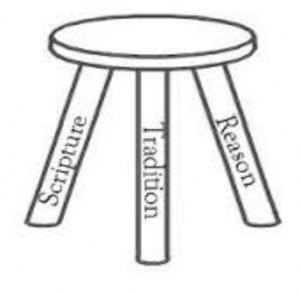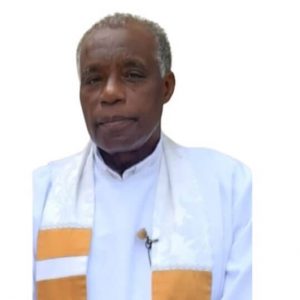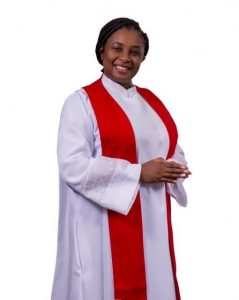Moral and Spiritual Development
AN EPISCOPAL MINDSET 
Experience
The principal factors believed to illuminate the core of the Christian faith for Episcopalian believers are
(1) Scripture, (2) Tradition and (3) Reason.
Scripture is considered the primary source and standard for Christian doctrine.
Tradition is experience and the witness of development and growth of the faith through the past centuries and in many nations and cultures.
Through reason, the individual Christian brings to bear on the Christian faith discerning and logical thought.
Building on the Anglican theological tradition, John Wesley added a fourth emphasis, experience; an individual’s understanding of the faith in the light of their own life.
These elements taken together bring individuals to a mature and fulfilling understanding of the Christian faith and the required response of worship and service.
Our Worship
In worship, we are united, acknowledging the holiness of God, to hear God’s Word, to offer prayer and to celebrate God’s presence among us. All are welcome to participate in our worship because it is in worship that we live out our lives as a Christian family, together. Scripture is the foundation of our worship. Services follow an order found in The Book of Common Prayer, two-thirds of which is from the Bible. Worship services include readings of Holy Scripture from the Old and New Testaments. Many of our prayers and hymns also come directly from Scripture.
The Book of Common Prayer includes a variety of ancient and modern prayers, as well as worship services for occasions when the whole community gathers or for individual use. The Book of Common Prayer allows everyone to participate, reminding us that each person is an important part of the worship experience, whether the service is a celebration or a solemn occasion. It is a guidebook for daily Christian living. Music—both traditional and contemporary—is an integral part of uniting our prayers and Scripture.
Celebrating God’s Presence
In our worship service, we celebrate God with us through water, bread and wine. Our Lord Jesus Christ tells us through water that we are united with God. We call this Baptism. The Anglican Church believes through baptism in any Christian denomination we become brothers and sisters in God’s family. (If you are not baptized and wish to be, you may contact the church office for more information.) Jesus shared bread and wine with his first followers and is with us today in this family meal we call Holy Communion. Through it we receive the forgiveness of our sins and a strengthening of our union with God and one another as we remember Christ’s life, death and resurrection.
Our Beliefs
We believe in One God who creates all things, redeems us from sin and death and renews us as Children of God. As Anglicans, we promise to follow Jesus Christ and we believe the mission of our Church is restoration of all people to unity with God and each other in Christ. We are enriched by your presence with us and welcome you no matter where you are on your own journey.
COMMON PRAYER
The Book of Common Prayer is a collection of ancient and modern prayers and worship services for occasions when the community gathers and is for individual use as well. It allows everyone to participate, reminding us that each person is an important part of the worship experience, whether the service is a celebration or a solemn occasion. It is a guidebook for daily Christian living. The BCP (as it is often called in worship service leaflets) has been revised several times, most recently in 1979. It was originally compiled by the Archbishop of Canterbury, Thomas Cranmer, in 1549. There are more than 70 million Anglicans (Episcopalians) in 163 countries throughout the world using The Book of Common Prayer in their own language, reflecting the Church’s diversity and numerous ethnic backgrounds.
“Common” does not mean “ordinary.” The Book of Common Prayer contains prayers we say together, or “in common,” when we worship as a community.
The primary worship service is the presentation of the Lord’s Last Supper with his disciples, a service we call the Holy Eucharist or Holy Communion. However, the first experience many visitors have with The Book of Common Prayer is at weddings, baptisms, or funerals in the Episcopal Church.
The prayer book also may be used for personal devotions. It includes prayers to use privately or with family, prayers for the morning and evening, special prayers of praise or thanksgiving, requests for others and for special occasions. All 150 Psalms—or poems from the Old Testament— are contained in The Book of Common Prayer. A calendar for reading through the entire Bible every three years is included, which we use to designate the Scripture readings for any worship service. The BCP also contains an outline of the Episcopal faith and Church history.
The Book of Common Prayer is meant to complement daily individual prayers, not to replace them. Every service in the book includes time for personal prayer requests, either silent or aloud. The Book of Common Prayer has been a source of comfort, joy and inspiration, a unique treasure in Christian worship for more than 400 years. Join us and experience for yourself the love and the presence of God in the Episcopal faith.
The Creeds
In the Episcopal Church, we say both the Apostles’ Creed and the Nicene Creed in our worship. Both are statements that contain a summary of our beliefs, and because we are a community of faith, we openly declare these beliefs to unite ourselves to Christians in the past, present and future. The word “creed” comes from the Latin word creo, which means “I believe.”
The Apostles’ Creed dates from the early years of the Christian Church and was used as a statement of faith at Baptism. It is included in the services of Morning and Evening Prayer that may be used both at Church and in private devotions.
The Nicene Creed was written in the year 325 by early bishops meeting in Nicaea (modern day Turkey). It is a statement that summarizes the Christian faith and is said in unison during services of Holy Eucharist.
What if a person still has doubts or questions?
It is not unusual to have doubts and questions. In the Episcopal Church, questions are encouraged. There are many groups, classes and forums available for discussing questions with other seekers. Or simply call the church office and make an appointment to speak with a clergy person. They are happy to help with questions of faith.
Relationship with God is a personal journey but also one we share with others in this community of faith. We recite the Creeds as we join with those around us in the process of discovering our own relationship with God.
SACRAMENTS
A sacrament is an outward and visible sign of an inward and invisible grace. In the Episcopal Church we take part in certain sacramental acts of worship that are reenactments of Christ’s ministries on earth. The two primary sacraments are Baptism and Holy Communion.
We believe that God is actively present in the world and in us. In the sacraments we realize his presence and his favor towards us. Through the sacraments, which are freely given to us by God, our sins are forgiven, our minds are enlightened, our hearts stirred and our wills strengthened. These sacraments are contained in the worship services found in The Book of Common Prayer. Your questions are encouraged and always welcome.
Holy Baptism
Baptism is the means by which we become members of the community of believers, defined in the New Testament as the Body of Christ. Just as Jesus was baptized with water by John the Baptist, we include people in the community of faith by baptizing them with water. Following a series of questions, responses and prayers, the priest pours water on the candidate. The sign of the cross may be made on the candidate’s forehead with blessed oil. In the Episcopal Church a person is baptized only once.
Holy Communion or Eucharist
Holy Communion is a reenactment of the Last Supper Jesus shared with his disciples before his death on the cross. Any baptized person is welcome to share in this meal of bread and wine.
The Other Sacraments Include:
Holy Matrimony
Holy Matrimony is Christian marriage, in which two people enter into a lifelong union and make their promises before God in a worship service.
Reconciliation of a Penitent or Confession
While private confession of sins is not a requirement, anyone may request the reconciliation of a penitent from a priest and receive assurance of God’s forgiveness. The confession is always made in private and kept in strict confidence.
Unction
Unction is a special blessing for those who are sick or desire special prayers. A sign of the cross is made on their forehead with blessed oil.
Ordination
Ordination is the sacrament whereby God empowers trained persons for special ministry as deacons, priests or bishops. The service always includes the laying on of hands by a bishop or bishops.
CHAPLAINCY TEAM

Rev. Anderson Maxwell

Rev. Danielle Pontiflet-Andre
Chapel
The chapel at the institution is named after The Right Rev. Rawle Douglin Emeritus– Bishop in charge during the founding of the schools in 2001.
FEAST DAYS CELEBRATED BY BATCE
- Ascension Day
- Ash Wednesday
- Christmas – December 25
- Easter
- Epiphany – January 06
- Holy Week
- St Clare of Assisi Feast Day – August 11
- St Francis Feast Day – October 04
- Trinity Sunday
